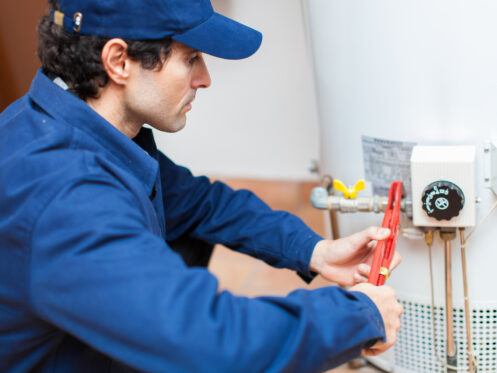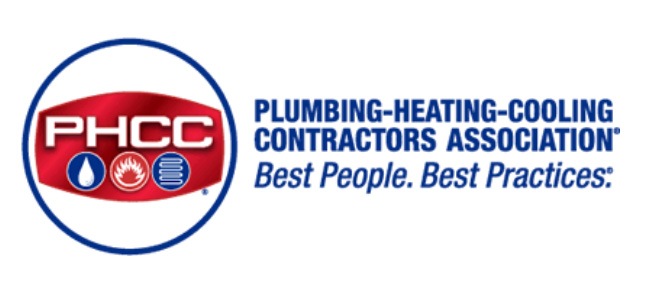Your water heater uses about 17% of your home’s total energy. This means increasing its efficiency can significantly decrease your energy bills. Electric water heaters usually kick on for roughly three hours a day. Installing a modern, more energy-efficient unit can cut the heater’s operation in half. That’s an enormous amount of conserved energy. In addition to replacing an outdated hot water heater, here are 12 other tips you can use to make the unit more cost-efficient.
1. Lower the Temperature
Turning down the temperature on your water heater greatly improves its efficiency by reducing standby heat losses. Energy use decreases by three to five percent for every 10 degrees Fahrenheit you lower the temperature. This not only reduces energy consumption but also protects against hot water burns. In addition, a decrease in temperature reduces mineral formation and corrosion in the tank, increasing the heater’s useful life.
Experts recommend setting the thermostat to 120 degrees Fahrenheit (49 degrees Celsius) to achieve optimal efficiency. You’ll want to avoid going below this temperature because it encourages the growth of bacteria in your water heater, like Legionella, the bacterium responsible for Legionnaire’s disease.
2. Insulate the Tank
Putting an insulating blanket over the tank helps keep the heat inside, especially in cooler climates like those experienced during winters in Sterling. As a result, the water heater can keep the water hot for extended periods of time without the need for frequent reheating. The United States Department of Energy claims that insulating blankets have the potential to cut water heating costs by up to nine percent. This low-priced strategy guarantees top efficiency and reduced energy use, which is good for the planet and the homeowner’s budget.
3. Use Low-Flow Fixtures
Low-flow fixtures limit water flow, cutting down on the quantity of warm water required for routine operations. In the case of showers, low-flow showerheads can reduce hot water use by 50% or more without reducing shower pressure. This immediately correlates to less demand placed on the water heater, which in turn translates to decreased energy use and cheaper monthly electricity costs. It also encourages water conservation.
4. Regularly Flush Sediment
Mineral sediment settles on the bottom of your hot water heater tank over time, blocking heat transfer and reducing tank efficiency. As a consequence, the water heater has to work overtime to keep up, which results in higher energy costs. By flushing the tank, this eliminates the accumulation, making it possible for the heater to resume normal operation. The United States Department of Energy estimates you can increase your hot water heater’s efficiency by at least 15% with periodic flushing.
5. Use Cold Water for Laundry
Using cold water to do laundry instead of hot water saves electricity since heating water requires a lot of power. When using cold water, keep in mind that you’ll need to use a detergent made for use in cold temperatures. This method not only reduces the hot water heater’s carbon footprint but also helps it last longer, making it an economical and sustainable option for doing laundry.
6. Install a Timer
Installing a timer on the hot water heater and using it only during peak demand improves the unit’s overall efficiency by minimizing both standby heating loss and wear and tear. Putting it on a timer so that it turns off at night or while you’re away also saves electricity. If you’re looking for an economical solution to enhancing your home’s water heating cycles, decreasing energy usage and saving on utility expenditures, having a plumber install a timer is one of the best moves you can make.
7. Insulate Hot Water Pipes
Insulating the pipes that carry hot water from the tank to the fixtures is a smart way to increase the efficiency of the hot water heater. This technique reduces the amount of heat that escapes from the pipes. In doing so, you save energy by reducing the amount of time that the water heater has to spend heating the water.
Insulation also prevents water from cooling down too quickly, so you’ll get hot water sooner rather than later. Furthermore, it helps prevent water from freezing in the pipes, which is especially problematic in areas with cooler climates like Sterling during the winter. Homeowners almost always benefit from increased efficiency and reduced energy bills by using this low-cost strategy.
8. Repair Leaks
Repairmen for hot water heaters pay special attention to locating and fixing any leaks. This is because the heater has to work harder to maintain the set temperature if there are leaks in the pipes or fittings. Due to the increasing workload, utility usage and costs will rise. Fixing hot water heater leaks isn’t a do-it-yourself fix. The technicians use a combination of visual examination and pressure testing to identify the leaks, as well as special tools to fix them.
9. Use a Drain Water Heat Recovery System
A drain water heater recovery system is an advanced piece of equipment that increases the efficiency of a water heater by recovering heat from wastewater. The technology lessens the demand placed on the water heater and, in turn, reduces the amount of energy needed to heat the water. Both of these advantages lead to lower energy consumption and energy bills. To install a drain water recovery system, the plumber will connect it to the existing plumbing, usually close to the hot water heater.
10. Consider a Tankless Water Heater
By removing the need for a storage tank, a tankless hot water heater, also known as an on-demand water heater, can significantly increase efficiency. This type of water heater quickly warms water as it goes through it, eliminating the need to reheat the water repeatedly. As a result, you have access to hot water whenever you need it, and standby heat loss is no longer a source of wasted energy.
11. Consider Solar Water Heating
By using the sun’s heat, a solar water heater makes the traditional hot water heating system more effective. The solar technology minimizes the amount of energy needed to achieve the target temperature, which in turn reduces energy consumption and utility expenses.
12. Consider a Heat Pump Water Heater
A heat pump water heater draws heat from the surrounding air and uses it to heat the water. This technique is highly efficient because it doesn’t waste energy through standby heat loss since it doesn’t actually produce heat. Instead, it transfers latent heat, resulting in much improved hot water heater performance with no additional energy expenditure.
The water heater is a major factor in the year-round cost and comfort of your house. Maintenance and care go a long way toward ensuring maximum efficiency. Here at Meade’s Heating and Air, we provide comprehensive installation, repair and maintenance for water heaters to Sterling homeowners. We also provide ductless AC installations and repairs, among our many other heating and cooling services. Get in touch with us immediately for information on how to make your water heater more cost-efficient.




